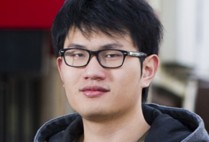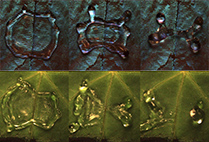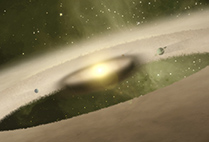When Jon Westling met Samuel McCracken in 1968, he recognized McCracken as “an intellectual leader” with interests deep and wide-ranging: music, art, literature, philosophy, theater, popular culture.
Both men were assistant professors at Reed College at the time, and both were teaching a required freshman humanities course; they would go on to become friends and colleagues at BU. Westling (Hon.’03) is now a BU president emeritus and a College of Arts & Sciences professor of history and humanities; McCracken was assistant to President John Silber (Hon.’95), for whom he worked as a researcher, writer, editor, and advisor for 31 years.
“Sam was among the most broadly learned, broadly enthusiastic, deeply interested in other people, events in the past, the present, and the future, of anybody I have ever known,” said Westling.
McCracken died on October 4, 2013. He was 77.
At a memorial service on November 8 at the George Sherman Union, friends remembered McCracken’s myriad interests, his fluency as a writer, his loyalty to Silber, and in the words of Brian Jorgensen, a CAS assistant professor emeritus of English, his “large and unrelentingly active mind.”
Westling noted that he’d had the good fortune of studying with two or three of the most renowned historians of English medieval history. “I learned as much about English history and English medieval history from Sam, who was not an English medieval historian,” he said, “as I did from either of those highly distinguished scholars. And not just English medieval history, but English history in general, European history, American history, English and American literature from the Anglo-Saxons to virtually the present moment, the history of railroading, the genealogy of the royal families of Europe going back a millennium or more.”
Presented by McCracken, those subjects were endlessly absorbing, Westling said. “I don’t give a hoot about the history of railroading,” he said, “but I listened in fascination as Sam would descant upon the history of railroading.”
McCracken also had an interest in camera collecting, “as an intellectual study of the history of lenses, shutters, and so forth,” said his wife, Natalie Jacobson McCracken, retired editor in chief for development and alumni publications at BU. The two met as undergraduates at Drake University, on the first day of their Shakespeare’s Chronicles class. She was struck by his prodigious memory.
“Without having tried to memorize them,” she recalled, “Sam knew the dates the monarchs were born, deposed, reinstated, perhaps deposed and reinstated again, and died.”
“His memory was freakish and encyclopedic,” his daughter, Elizabeth McCracken (CAS’88, GRS’88), told the Boston Globe. “I’m not sure if you could call it photographic, but he didn’t seem to ever have forgotten a fact that he learned from a book.”
James Brann, a College of Communication professor emeritus of journalism, who was chairman of COM’s journalism department from 1973 to 1980, said he was often called upon to give speeches in the mid-1970s. He made a habit of checking his facts with McCracken, who could summon the answers from memory. “Sam was my Google before Google was invented,” Brann said.
McCracken was born in Columbus, Ohio, in 1935. After graduating from Drake, he earned a master’s in English from the University of Connecticut and did graduate work at the University of Wisconsin–Madison and the University of London.
The McCrackens were married in 1959, and in 1963, Sam McCracken became an English instructor at BU. Four years later, he joined the faculty at Reed College, then returned to BU in 1974 as assistant to the president. “He and John Silber had great respect and affection for each other,” his wife said.
“It was a working relationship, but also a real friendship,” his son, Harry McCracken (CAS’86), told the Globe. “It was just the ideal job for someone like my father.”
McCracken wrote The War Against the Atom (Basic Books, 1982) and articles for many publications, including Commentary, National Review, the New Republic, the New York Times and New York Times Book Review, and Columbia University’s alumni magazine. He retired from BU in 2005.
Vita Paladino, director of the Howard Gotlieb Archival Research Center, said McCracken believed in “improving everything in his world. This would include notifying us when he found a factual error in an exhibition label. He was more worried about your making yourself look foolish than he was about making himself look smart. He wanted us to look good.”
Paladino (MET’79, SSW’93) described her friend as remarkable, amazing, and funny. “You are lucky to meet one Sam McCracken in your life,” she said.













































Related Stories
Mind Reader
To treat language disorders, Tyler Perrachione investigates what makes dyslexic brains different
Take Your Mind Out for a Spin
Thurman Center program for intellectual, curious students
The Woman with the Groundbreaking Mind
ENG alum’s career devoted to addressing critical aviation challenges
Post Your Comment